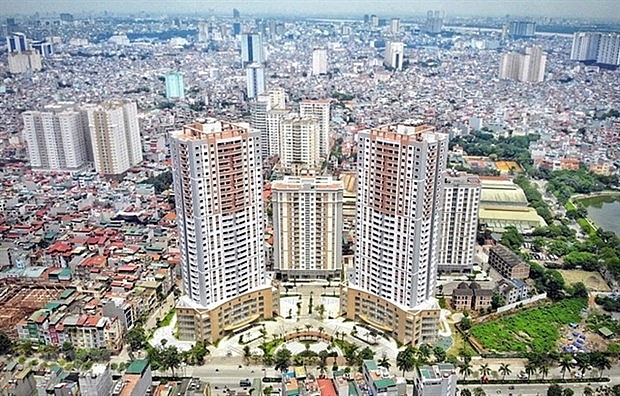Real estate activities picking up across the country
 |
| Illustrative image (Photo: VNA) |
The International Finance Corporation, a member of the World Bank Group, on November 24 proposed an investment of $44 million in Vietnam’s real estate developer Nam Long Group’s project WaterPoint Phase II. The 190-hectare project will be located in Long An province, around 30km southwest of Ho Chi Minh City, with a total cost estimated at $411 million.
According to JLL Vietnam and RCA Analytics, real estate transaction size in Vietnam by land area increased significantly between 2020 and 2021, from less than 200ha in 2016 to 850ha in 2020. Significantly, the same value was reported in the first half of 2021.
Leading real estate groups have announced business results with good growth, and profits increasing many times over the same period in 2020. Typically, Vinhomes’ net profit increased by 82 per cent over the same period last year, while Novaland Group also recorded an increase of nearly 159 per cent in consolidated revenue in the third quarter compared to the same period of last year.
The residential real estate group has a higher volume of transactions than other property types with prominent faces such as Nishi Nippon Railroad from Japan, Ascott Group Ltd. (CapitaLand) from Singapore, or Matrix Holding Ltd. from the United States.
In the industrial real estate segment, Cortronic Company recorded real estate transactions in Phu My Industrial Park in the southern province of Ba Ria-Vung Tau with a transaction value of $30 million.
As for the medical service real estate group, Aseana Properties Ltd. sold a stake in City International Hospital to a joint venture partner for a value of approximately $95 million.
However, in the context of land fund shortage even before the pandemic, JLL forecasts that the race to acquire land funds by real estate developers in Vietnam will continue to be exciting, and this will change the area of land and housing market in the next five years.
Meanwhile, the hotel industry in Asia-Pacific has understandably witnessed the lowest number of transactions in the past five years. However, according to Mauro Gasparotti, director of Savills Hotels Asia-Pacific, such deals in the hotel sector may be back on track with some of the first major deals. In the past few months, the market has become more active with both acquisitions completed and properties being listed for sale.
“We have noted a good interest for prime hospitality assets in Vietnam from both local and foreign high-net-worth individuals who are not necessarily part of the lodging industry, but their purposes are into the ownership prestige as well as investment diversification,” Gasparotti explained.
On the other hand, Vietnamese hospitality still appeals for foreign capital, especially hospitality funds that have been unsuccessfully entering the market in the past few years due to the limited availability of properties for sale.
“We see a lot of opportunities for developers that can understand hospitality products and embrace megatrends such as sustainability, wellness, and technologies that focus on creating experiences,” he added.
As a rule of thumb, international investors are closely watching beach locations with preference to those in proximity to international airports, and properties with good quality design, and able to be upgraded or rebranded, he said. The upside potential is very crucial for investors that are willing to go through the process of rebranding the properties if the exercise will lead to higher rates. Existing properties with additional land for further expansion are also interesting to local buyers.
“Looking forward, we expect 2022 to be an active year for transaction markets and we have already seen activities picking up. Hopefully, when international tourism resumes, it will bring confidence back to the industry,” Gasparotti said.
What the stars mean:
★ Poor ★ ★ Promising ★★★ Good ★★★★ Very good ★★★★★ Exceptional
Related Contents
Latest News
More News
- Dong Nai experiences shifting expectations and new industrial cycle (January 28, 2026 | 09:00)
- An Phat 5 Industrial Park targets ESG-driven investors in Hai Phong (January 26, 2026 | 08:30)
- Decree opens incentives for green urban development (January 24, 2026 | 11:18)
- Public investment is reshaping real estate’s role in Vietnam (January 21, 2026 | 10:04)
- Ho Chi Minh City seeks investor to revive Binh Quoi–Thanh Da project (January 19, 2026 | 11:58)
- Sun Group launches construction of Rach Chiec sports complex (January 16, 2026 | 16:17)
- CEO Group breaks ground on first industrial park in Haiphong Free Trade Zone (January 15, 2026 | 15:47)
- BRIGHTPARK Entertainment Complex opens in Ninh Binh (January 12, 2026 | 14:27)
- Ho Chi Minh City's industrial parks top $5.3 billion investment in 2025 (January 06, 2026 | 08:38)
- Why Vietnam must build a global strategy for its construction industry (December 31, 2025 | 18:57)

 Tag:
Tag:



















 Mobile Version
Mobile Version